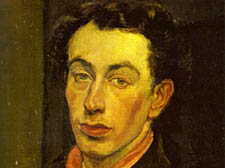|
|
 |
| |
 Self Portrait (1910/11) Self Portrait (1910/11) |
A genius that flowered in the trenches
Isaac Rosenberg is the greatest of the First World War poets, but his work rarely receives the credit it deserves, writes Ruth Gorb order this book
IF the First World War still has a terrible glamour about it, it could be said to lie in its poetry.
We have heart-rending work by Siegfried Sassoon, Wilfred Owen, Rupert Brooke – gentlemen poets all of them, and well represented in anthologies.
It is much rarer to find work by Isaac Rosenberg. But then, he was not a gentleman.
He died 90 years ago this month, on the Western Front. He had known the life of a private soldier, with all its horrors of cold and lice and hunger.
His biographer, Jean Moorcroft Wilson, states it simply but with passion. “He’s the one putting up the barbed wire,” she says. “The one who has brains spattered in his face as he carries a stretcher… and [the one] who can still write a poem like Returning, We Hear the Larks.”
Moorcroft Wilson thinks he is the most outstanding of the war poets, and Sassoon, Eliot and the legendary critic FR Leavis agree with her.
Why, then, does he not have the place in literary history that he deserves? It was time, Moorcroft Wilson decided, for a reassessment of a remarkable man, and time, after a gap of 30 years, for a new biography.
Moorcroft Wilson is singularly well-qualified for the job. A lecturer in English at London University, she has written several much-admired biographies including one on Virginia Woolf, and the definitive work on Siegfried Sassoon – a task that took her 13 years to complete. She is, most significantly, the editor of The War Poets series of publications.
She is married to Cecil Woolf, nephew of Leonard Woolf, husband of Virginia. To visit the Cecil Woolfs in their narrow, elegantly crumbling house in Mornington Crescent is to step back into early 20th-century Bloomsbury.
But if the Bloomsbury set knew anything about Rosenberg, Moorcroft Wilson says, they would certainly have had nothing to do with him. He was a Jew from the East End, undersized, plain, with a stammer and terrible teeth and a thick Cockney accent which he did nothing to disguise.
“Poor little Isaac,” one is tempted to say, but Moorcroft Wilson says his life was a fascinating mixture of both good and ill fortune.
Yes, he was poor, puny and frankly charmless, but he managed throughout his short life to find benefactors who promoted his work and saw that he did not starve.
And he was after all, says Moorcroft Wilson with conviction, a genius.
Rosenberg started life as a painter, and with the help of his patron, Mrs Herbert Cohen, was able to go to the Slade School of Art where he met other young rising talents such as David Bomberg, Stanley Spencer, CRW Nevinson and Mark Gertler. His paintings, many of them reproduced in this biography, are remarkable.
Coming as he did from grinding poverty and appalling surroundings, where did Rosenberg’s lyrical talent come from?
You have only to look at his immigrant parents. His father, Barnett, was a scholar and an amateur poet who had to support his family by working as an itinerant pedlar.
Isaac’s mother, Anna, had a strong aesthetic sense, stitching exquisite embroideries, which she sold to the rich Jewish ladies of north London.
She used the connection to get her son on the road to betterment. One of her customers, Mrs Amshewitz, had her artist son John introduce young Isaac to the circle of artists and writers who met at his studio in Parkhill Road in Hampstead – one, a middle-aged schoolmistress from Highgate, Miss Winifreda Seaton, was to be a friend and support to Rosenberg for the rest of his life.
Moorcroft Wilson was amazed at how much new material she found during her research.
“In a gap of 30 years [since the last biography], people die and documents are deposited,” she explains. “I found, for instance, a six-page letter from Bomberg to Joseph Leftwich that was all about Rosenberg. And I could hardly believe it when a lady in her 90s telephoned me and asked if I would be interested in a memoir of her mother. Her mother was Sonia Cohen, the love of Isaac Rosenberg’s life.”
It was a love which came to nothing. Rosenberg’s love life was hardly rich, although Moorcroft Wilson is sure that he had an affair when he went to live in South Africa.
He had gone there in a state of restlessness, unable to choose between art and poetry, and in the warmth of Cape Town his poetry blossomed.
It also became significantly sexier. He met and fell in love with Marda Vann, a seductive little actress with a blonde bob and a saucy reputation.
Moorcroft Wilson is the first Rosenberg biographer to follow his trail to South Africa, and she has seen letters they exchanged. “They were very flirtatious,” she says, “and his poems at that time were full of erotic detail.
“I don’t think he joined the army because he wanted to fight; he was homesick, and I have a suspicion that Marda had dumped him.”
Rosenberg was, by all accounts, a hopeless soldier. But it was in the midst of all the horror of war that he became a sublime poet. In a letter he wrote in 1916 he said: “I think the only value in any war is the literature it results in.”
For Moorcroft Wilson he is unique; a modernist before his time, a poet in whom one can always see the painter, a man who came from a deprived background and achieved greatness. She hopes, she says, that she has reclaimed him.
|
 |
|
 |
 |
|
 |
|



